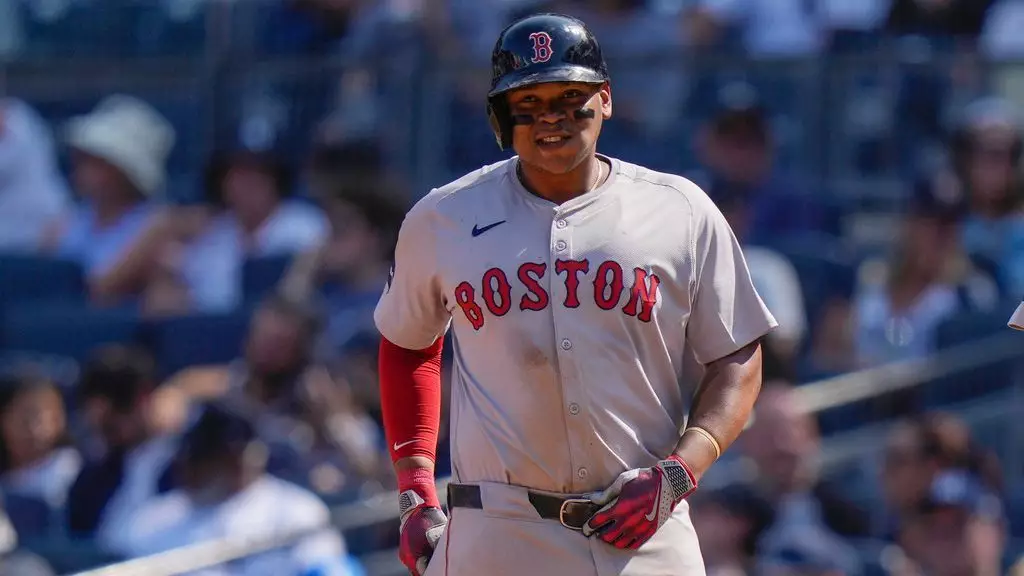In the high-stakes world of Major League Baseball, position changes can redefine a player’s career trajectory. For Rafael Devers, the Boston Red Sox’s powerful designated hitter, the idea of transitioning to first base amid teammate Triston Casas’s injury is not just a tactical consideration; it represents a crossroads in his career. Devers, a three-time All-Star and a cornerstone of the Red Sox lineup, finds himself at odds with management’s expectations. In a recent interaction with the press, he made it abundantly clear: his allegiance lies firmly with the DH role. What Devers conveys transcends the ballpark; it speaks to athlete empowerment, personal boundaries, and the balance of team dynamics.
The Past’s Shadow
The shadow of earlier position swaps looms large over Devers’s current stance. This is not the first time he has been asked to shuffle positions; the saga began when the Red Sox signed All-Star third baseman Alex Bregman, which relegated Devers to DH—a role he has embraced with both arms, finding power at the plate while navigating the complexities of team strategy. “They told me to put away my glove,” he stated, revealing the duality of loyalty and self-preservation. Here, Devers stands unwavering, drawing a line in the sand after a transition he felt was executed without proper consultation or respect. This resonates with players across the league: the message is clear—athletes must advocate for their own best interests, even within team confines.
Communication Breakdown
In the backdrop of baseball discussions, communication—or the lack thereof—reigns supreme. Devers candidly shared his conversations with Craig Breslow, the Red Sox chief baseball officer. Devers’s statements indicate a potential rift between the management’s expectations and his capabilities on the field. His comment about Breslow understanding the difficulty of position changes hints at a concerning disconnect. “I know the kind of player that I am,” he declared, positioning himself as more than just a versatile athlete; he is a specialized hitter with a singular focus.
What happens when an organization asks its stars to step outside their established roles? Players like Devers become more than athletes—they become representative figures advocating for their own professional dignity. By stating, “They should hit the market and look for another player,” Devers is urging the front office to recognize that successful teams are built on defined roles, not murky job descriptions.
The Power of Identity
In his resolute defiance, Devers embodies the ongoing narrative of personal identity in sports. For many players, the position on their jersey becomes synonymous with their value and contribution to the team. By asserting his role as a full-time DH, Devers sends a message not just to the Red Sox management, but to players across the league: identity matters. The reluctance to switch positions isn’t merely about comfort; it’s about maintaining the craftsmanship and specialized skill that makes him who he is.
He expressed disappointment regarding the management’s consideration of him for first base, emphasizing, “I’m not sure why they want me to be an in-between.” This demonstrates deeper issues in player-coach dynamics, where athletes can feel like pawns in a larger game. The unwillingness to conform to temporary tactics showcases Devers’s integrity, pushing back against a system that sometimes prioritizes flexibility over focus.
A Message to Management
Rafael Devers’s statement marks a critical point in the ongoing dialogue of player agency in Major League Baseball. He directly challenges management to find alternative solutions, using his platform to shine light on the need for teams to invest thoughtfully in their rosters. As new players step into roles, it’s pivotal that management navigates a landscape that honors the expertise of established players.
In Devers, we see an athlete armed with confidence and a clear vision. He not only champions his worth but stands as a testament to the importance of recognizing individual roles in team settings. His narrative is an empowering reminder that professional athletes deserve the opportunity to define their careers, with an unwavering commitment to their identity on the field.


Leave a Reply